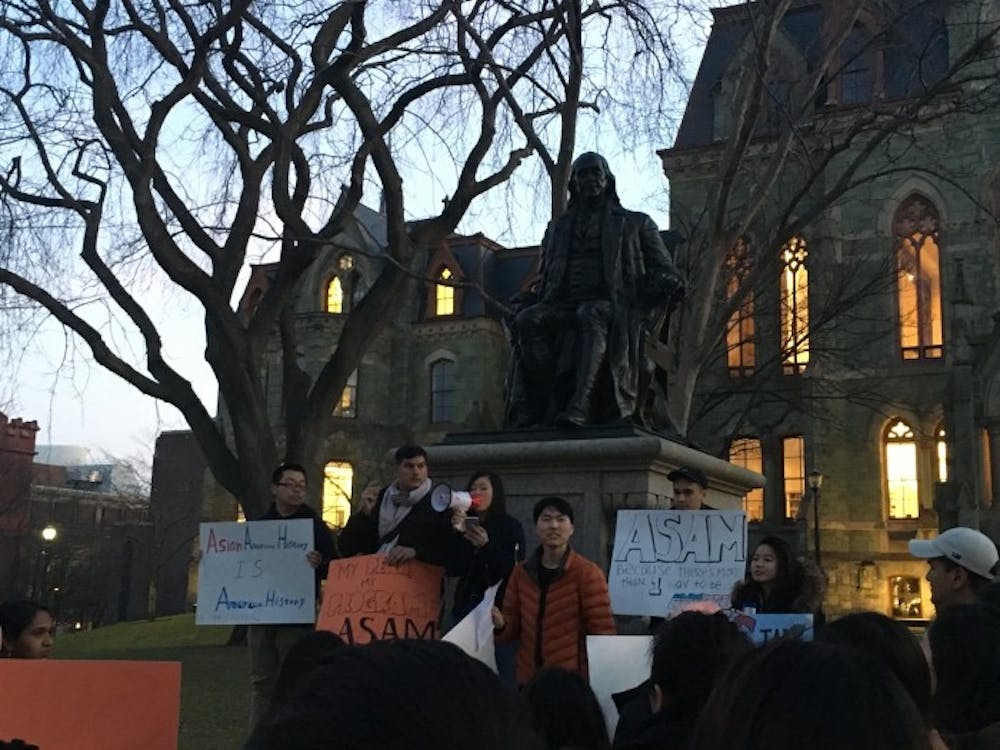
"Despite the College’s claims that it is 'firmly committed' to ASAM, their actions speak louder than official-sounding statements via email," DP columnist Jessica Li wrote in October. "Direct action must be taken to save this program that is essential to the fabric of our University."
Credit: Julia SchorrIn the fall of 1996, Penn created an Asian American Studies program, home to a series of interdisciplinary courses and an undergraduate minor. Twenty-one years later, the ASAM program has no formal director, despite months of student petitions and protests geared toward increasing University support for the small program.
Dean of the School of Arts and Sciences Steven Fluharty and other top University officials have expressed support for ASAM, but Penn has not set into motion any formal plan or policy change to reassure students desperate to preserve the program.
Heading into 2018, the ASAM program is at a crossroad: its courses cross-listed with the English and Sociology departments are some of the largest courses in those departments, but without a director or robust physical space, the ASAM program may not thrive for much longer.
As a means of tracking the changes to ASAM over the past year, here's an overview of the most important developments in the battle to preserve Asian American studies at Penn:
When ASAM lost its director, Penn never replaced her
The state of Asian American Studies at Penn became uncertain when Grace Kao, a founding faculty member and longtime director of the program, departed for Yale University in January.
Kao's departure sparked protests and action by ASAM's Undergraduate Advisory Board, which held an open forum, released a petition aimed at Penn administrators, and wrote a guest column in The Daily Pennsylvanian entitled, "Who killed Asian American studies?"
Without Kao as director, the bulk of the program's administrative duties fell on Associate Director Fariha Khan, "leaving her unable to focus on the growth of the program and limiting her ability to teach," the ASAM UAB petition said.

A petition launched months of protests and overtures to the administration
In the guest column, the ASAM UAB spelled out five "suggestions on how to best support and proceed with the program," including hiring a professor to replace Kao, increasing administrative support, physical space, the variety of courses offered for the program, and providing more support for all ethnic and minority studies programs on campus.
Many of the sentiments in the column were echoed during the open forum, which was held in February following protests by Asian American students and faculty members on College Green. During this time, Fluharty had been slow to respond to emails from the ASAM UAB. After three emails over the course of two months, he responded, "Penn will continue our strong commitment to the Asian American Studies Program," and cited traveling and the holidays as reason for his delay.
Months after the protest, students and faculty noticed little change
Despite a semester of protests and outreach to University administrators, ASAM UAB members said in September that there has been almost no progress toward addressing their concerns since Kao's departure.
Fluharty's office agreed to put out an ad for a full-time lecturer, but for administrators, ASAM appears to not be a high priority. In an interview with the DP in October, Provost Wendell Pritchett — who was appointed in the spring and installed in July — said ASAM "hasn't come up" in his periodic meetings with the deans of Penn's major schools, but is "certain that it will."
"Despite the College’s claims that it is 'firmly committed' to ASAM, their actions speak louder than official-sounding statements via email," DP columnist Jessica Li wrote in early October. "Direct action must be taken to save this program that is essential to the fabric of our University."
The Daily Pennsylvanian is an independent, student-run newspaper. Please consider making a donation to support the coverage that shapes the University. Your generosity ensures a future of strong journalism at Penn.
Donate






